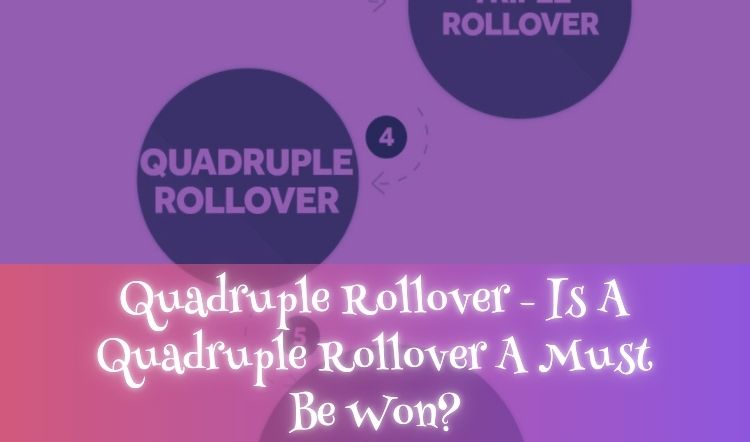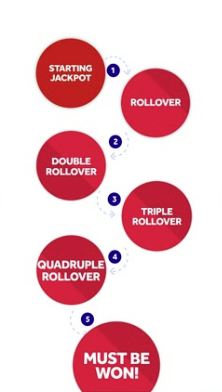
If you are new to lottery games, you may come across different terms like “rollover” and “Must Be Won” when reading about potential jackpots. Understanding these terms can make the experience clearer before deciding whether to take part.
This blog explains what a quadruple rollover means, how it fits into National Lottery draws, how many times a jackpot can roll over, and whether a quadruple rollover must be won. It also covers related topics like the rolldown process and responsible gambling practices.
Lotteries are random games of chance. This means there is no way to predict or guarantee a win. The National Lottery, operated by Allwyn (previously Camelot), runs draws in line with strict regulations from the UK Gambling Commission (UKGC) to ensure fairness and transparency.
What Is A Quadruple Rollover?
A rollover happens when no one wins the jackpot in a lottery draw. In the UK Lotto game, this means that none of the players have matched all six main numbers drawn. When this occurs, the jackpot prize does not get paid out, but instead is carried over, or "rolled over", into the next scheduled draw.
If the jackpot is not won once, it becomes a single rollover. If the jackpot is not won over four consecutive draws, it is known as a quadruple rollover. By this point, the total prize fund can become quite large because it has accumulated across multiple draws without a top prize winner.
A rollover only takes place when nobody matches all six main numbers. A quadruple rollover specifically refers to four draws in a row where the jackpot remains unclaimed. Each rollover increases the amount available to be won, although the prize can only be claimed by someone who matches all six numbers, unless it eventually reaches a stage where special rules apply, such as a Must Be Won draw.
It is important to understand that winning the lottery is statistically rare. The odds of matching all six numbers in the UK Lotto are around 1 in 45 million, meaning that jackpots can often roll over several times before a winning ticket is drawn.
How Many Times Can The Lottery Roll Over?
The National Lottery allows the jackpot to roll over a maximum of five times. This includes:
-
The original jackpot draw.
-
Up to four consecutive rollovers (single, double, triple, and quadruple rollover).
If the jackpot still has not been won after the fifth draw, it must move into a phase called a Must Be Won draw. This means that the jackpot will not roll over again. Instead, it will either be won by matching all six numbers or, if nobody does so, the prize money will be shared among players who have matched fewer numbers.
Each game, such as Lotto or EuroMillions, may have specific rules about rollover limits. Players may want to check the terms and conditions before entering.
Does A Quadruple Rollover Have To Be Won?
A quadruple rollover does not have to be won. It is treated like any regular Lotto draw, where players must match all six main numbers drawn in order to win the jackpot. If nobody manages to match all six numbers during a quadruple rollover, the jackpot prize does not get awarded and instead moves forward to the next draw.
Following a quadruple rollover, if the jackpot still remains unclaimed, it progresses to the fifth consecutive draw. This fifth draw is known as a Must Be Won event.
In a normal quadruple rollover, players are required to match all six numbers to claim the jackpot. If no one achieves this, the jackpot amount is not handed out, but is rolled forward into the Must Be Won draw.
The key difference with a Must Be Won draw is that the potential prize money will still be distributed even if no player matches all six main numbers. If the jackpot is not won outright during a Must Be Won draw, the prize fund does not roll over again. Instead, it is shared among players who have managed to match some of the drawn numbers, such as two, three, four, or five numbers. This process of sharing the jackpot among winners of lower prize tiers is known as a rolldown.
Is A Quadruple Rollover A Roll Down?
A quadruple rollover is not a rolldown. A rolldown only happens during a Must Be Won draw.
In a rolldown:
-
If nobody matches six numbers in a Must Be Won draw, the jackpot money is shared across lower prize tiers (such as players matching five numbers, four numbers, three numbers, or even two numbers, depending on the game and the number of winners).
For example:
-
Normally, matching two numbers in Lotto gives you a free Lotto Lucky Dip.
-
In a rolldown, matching two numbers may potentially give you a cash prize (around £5) plus a Lotto Lucky Dip.
The exact amount you receive will depend on how many people have matched the required numbers. The fewer the winners, the larger the potential prizes can be. The more winners there are, the more the jackpot fund is divided.
It is important to note that prizes in lotteries are subject to the rules of chance. No outcome can be guaranteed, and prize amounts can vary from draw to draw.
Quadruple Rollover Rules
There are no special rules for a quadruple rollover beyond the normal Lotto rules:
-
You need to match all six main numbers drawn to win the jackpot.
-
The jackpot prize can continue to grow if it is not won, up to the fifth rollover.
-
Quadruple rollovers can involve very large prize pools, but the jackpot will only be won if someone matches six numbers.
-
After a quadruple rollover, if the jackpot still is not won, it moves into the Must Be Won phase.
In addition:
-
For the Lotto, you must be aged 18 or over to buy a ticket or claim a potential prize.
-
Jackpot caps may apply in some games like EuroMillions. For example, the EuroMillions jackpot starts at around €17 million and can reach a cap of around €250 million (subject to periodic increases).
-
Different lottery games have different rules, so players may want to read the game terms carefully.
Playing lotteries should be viewed as a form of entertainment, not as a way to make money. Responsible gambling means setting limits, only spending what you can afford, and knowing when to take a break. Free tools and support are available through organisations such as GamCare and BeGambleAware.org.
*All values (Bet Levels, Maximum Wins etc.) mentioned in relation to these games are subject to change at any time. Game features mentioned may not be available in some jurisdictions.
**The information provided in this blog is intended for educational purposes and should not be construed as betting advice or a guarantee of success. Always gamble responsibly.
